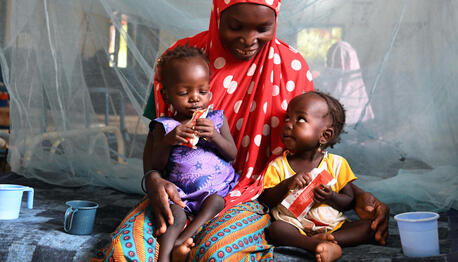
Food Crisis in the Sahel
Close to 1 million children under age 5 in the Sahel region are at risk of severe wasting, an extreme, life-threatening form of malnutrition. UNICEF is there.
How UNICEF is responding to the Sahel food crisis
Africa's Sahel region has a history of cycling through periods of famine from unstable agriculture caused by drought. High food prices, conflict and displacement, climate change impacts and the COVID-19 pandemic have driven millions of people into acute hunger and malnutrition — contributing to a surge in the number of children requiring treatment for severe acute malnutrition.
By July 2022, a surge in armed conflict across Burkina Faso, Mali and Niger in the central Sahel had displaced 2.9 million people both internally and across borders. Hostilities continue to threaten lives and livelihoods as essential services — health, water and sanitation, nutrition and education — are disrupted, leaving millions of children in need of humanitarian aid.
Close to 1 million children under age 5 at risk of severe wasting in the Sahel
UNICEF estimates that there are close to one million children under age 5 in the region at risk of severe wasting, an extreme, life-threatening form of malnutrition.
With fighting spreading to previously unaffected countries, including Benin, Côte d’Ivoire, Ghana, Guinea and Togo, UNICEF is ramping up the regional response.
UNICEF is taking action to meet the urgent needs of vulnerable children and families in the Sahel by delivering Ready-to-Use Therapeutic Food (RUTF) to treat children suffering from severe acute malnutrition and providing safe water and sanitation, among other lifesaving interventions.
UNICEF is also working with local governments and other partners to improve and secure food availability in communities, and to access and use local food resources. Other partnership efforts aim to improve and sustain access to quality health and other social services, and build community resilience.
"Malnutrition silently stalks children across the Sahel," said Marie-Pierre Poirier, UNICEF Regional Director for West and Central Africa. "We have been able to deliver the supplies and medicines these children need to survive, but equally important are investments in preventive measures and early detection to stop children from getting sick in the first place."
Learn how UNICEF works to address climate change and its impact on children.
Learn how UNICEF responds to famine and food crises globally.
Help UNICEF deliver lifesaving nutrition to children in need. Your $60 donation can provide two months’ worth of Ready-to-Use Therapeutic Food — enough to bring a severely malnourished child back to health.